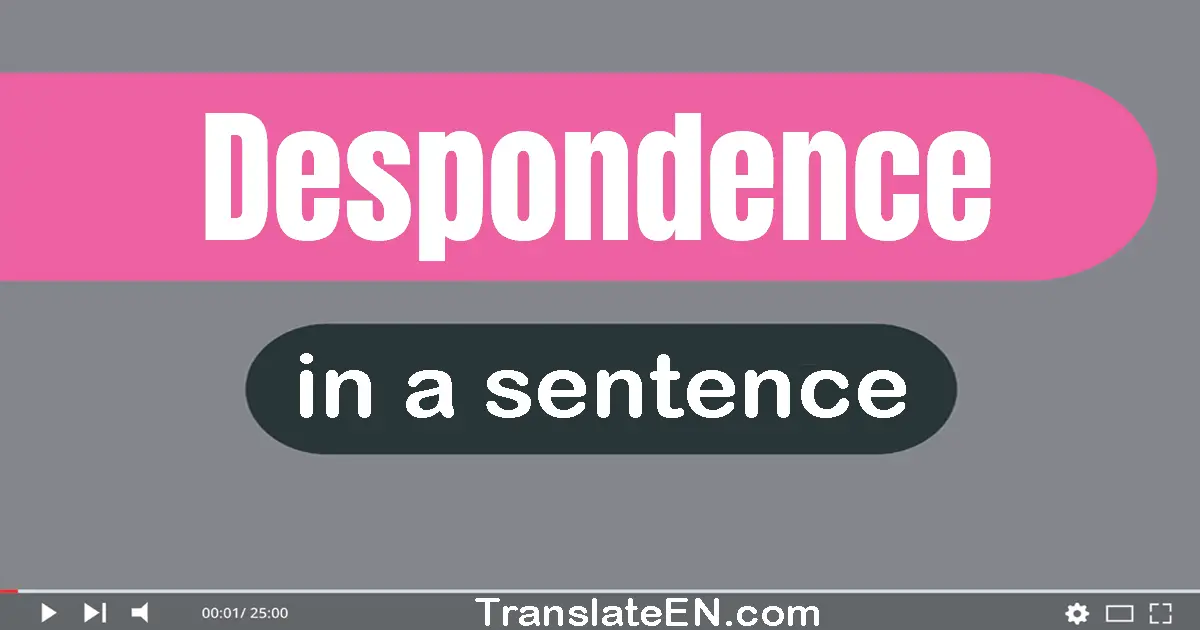Despondence in a sentence
Synonym: despair, hopelessness. Antonym: hopefulness
Meaning: A state of being despondent; loss of hope or confidence.

(1) The loss of his job left him in a state of despondence.
(2) The constant failures had led him to a state of despondence.
(3) The news of her father's illness filled her with despondence.
(4) The despondence in her eyes mirrored the pain she felt inside.
(5) The despondence in his words revealed the depth of his despair.
(6) The despondence in his posture revealed the weight of his burdens.
(7) The despondence in her expression revealed the depth of her sorrow.
(8) The despondence in his demeanor was a result of his recent setbacks.
(9) She couldn't shake off the feeling of despondence after her breakup.
(10) The rainy weather added to her despondence and made her feel gloomy.
Despondence sentence
(11) The despondence in his voice was a reflection of his shattered dreams.
(12) The despondence in her words conveyed the depth of her disappointment.
(13) The despondence in his words echoed the disappointment he felt inside.
(14) The death of her pet dog left her in a state of despondence for weeks.
(15) The despondence in his expression was a testament to his inner turmoil.
(16) The lack of progress in his project left him in a state of despondence.
(17) The failure of his business venture left him in a state of despondence.
(18) The despondence in his eyes was evident as he spoke about his struggles.
(19) The despondence in her heart grew with each passing day of unemployment.
(20) The despondence in her eyes was a reflection of the pain she had endured.
Despondence make sentence
(21) The despondence in his voice was palpable as he shared his disappointment.
(22) The despondence in his eyes spoke volumes about his current state of mind.
(23) The weight of despondence hung heavy in the air as they mourned their loss.
(24) The despondence in his demeanor was a stark contrast to his usual optimism.
(25) The despondence in her voice was a clear indication of her emotional state.
(26) The despondence in his voice was a clear indication of his emotional state.
(27) The constant criticism from her boss had led her to a state of despondence.
(28) He couldn't shake off the despondence that had settled in after his failure.
(29) The despondence in her voice was a stark contrast to her usual cheerfulness.
(30) The constant rejection from publishers had led her to a state of despondence.
Sentence of despondence
(31) The feeling of despondence overwhelmed her as she faced yet another rejection.
(32) The despondence in the room was palpable as they faced their uncertain future.
(33) The room was filled with a sense of despondence after the news of their defeat.
(34) The despondence in her heart was a constant companion during her darkest moments.
(35) The despondence in her demeanor was a reflection of the challenges she had faced.
(36) The despondence in their faces was a reflection of the hardships they had endured.
(37) The despondence in his words resonated with those who had experienced similar struggles.
(38) The despondence in the room was almost suffocating as they faced their collective failure.
Despondence meaning
Despondence is a noun that refers to a state of extreme sadness or hopelessness. It is a feeling of complete despair and loss of hope that can be caused by various factors such as failure, loss, or disappointment. Despondence is a common emotion that people experience at some point in their lives, and it can be challenging to overcome. If you are looking to use the word despondence in a sentence, there are a few tips that you can follow to ensure that you use it correctly and effectively. Here are some tips to help you use despondence in a sentence:
1. Understand the meaning of the word: Before you use the word despondence in a sentence, it is essential to understand its meaning. Despondence refers to a feeling of extreme sadness or hopelessness, so you should use it in a context that reflects this meaning.
2. Use it in the right context: Despondence is a word that is often used in a serious or formal context. It is not a word that you would use in casual conversation or in a lighthearted context. Therefore, when using despondence in a sentence, make sure that the context is appropriate.
3. Use it to describe a person or situation: Despondence is often used to describe a person or situation that is experiencing extreme sadness or hopelessness.
For example, you could say, "After losing his job, John fell into a state of despondence." This sentence uses despondence to describe John's emotional state after losing his job.
4. Use it with other descriptive words: To make your sentence more descriptive and impactful, you can use despondence with other descriptive words.
For example, you could say, "The news of her father's death left her in a state of deep despondence and despair." This sentence uses despondence with the words "deep" and "despair" to create a more vivid and emotional description.
5. Use it sparingly: Despondence is a powerful word that should be used sparingly. Overusing it can make your writing sound melodramatic or exaggerated. Therefore, use despondence only when it is necessary and appropriate.
In conclusion, despondence is a word that can add depth and emotion to your writing when used correctly. By following these tips, you can use despondence in a sentence effectively and create a more impactful and descriptive piece of writing.
The word usage examples above have been gathered from various sources to reflect current and historical usage of the word Despondence. They do not represent the opinions of TranslateEN.com.
